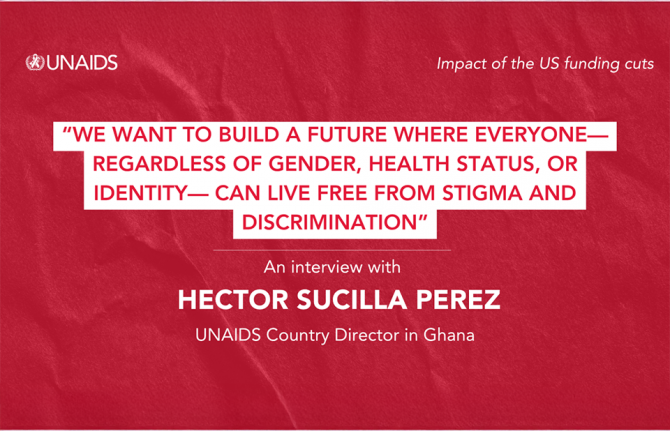
Feature Story
UNAIDS Executive Director calls for greater local production of HIV medicines in Ghana
24 February 2012
24 February 2012 24 February 2012
UNAIDS Executive Director Michel Sidibé (left) met with the President John Evans Atta Mills of Ghana on 24 February in Accra.
Credit: UNAIDS/R.Chintoh
Meeting today with John Evans Atta Mills, President of the Republic of Ghana, UNAIDS Executive Director Michel Sidibé sounded a theme from his recent missions in Bénin and Togo: sustainability of the AIDS response in Africa.
Noting that a vast majority of antiretroviral medicines consumed in Africa are imported from overseas, Mr Sidibé underscored the urgent need for home-grown solutions to ensure the long-term availability of these drugs at affordable prices.
“African countries must catalyse the local production of high-quality medicines,” said Mr Sidibé, while meeting with President Mills at his offices in Accra. “Ghana can develop centres of excellence and lead the way in an effective continental response to HIV,” he added.
President Mills said he looked forward to the day when Ghana was able to manufacture HIV medicines for its population at large and neighboring countries in the region. “This will a major boost for us,” he said.
Preventing HIV among children
During the meeting, the UNAIDS Executive Director expressed concern over the low coverage (51%) of services in Ghana to prevent HIV transmission from mother to child (PMTCT). He said that it is ethically unacceptable for any child to be born with HIV and emphasized the economic rationale for expanding PMTCT services: preventing HIV is far less costly than life-long treatment.
Mr Sidibé urged the President to champion the UNAIDS vision of “Zero new HIV infections among children” across the country. “No baby born with HIV by the year 2015—this can be your legacy for Ghana,” he said, adding that keeping their mothers alive is equally imperative.
Addressing stigma and discrimination
During his meeting with President Mills, the UNAIDS Executive Director noted with concern that stigma and discrimination continue to block an effective response to HIV in Ghana—especially for people living with HIV and key populations at higher risk of infection, such as sex workers, men who have sex with men, and people who use drugs.
The President said that he was hopeful a new nation-wide campaign called “Heart to Heart” would help reduce the widespread stigma and discrimination in his country. Launched on World AIDS Day 2011, the campaign aims to re-engineer deep-rooted beliefs and behaviors towards people living with HIV by giving a “human face” to the epidemic.
Roundtable discussion with partners
At a roundtable discussion earlier in the day with high-level representatives from government, civil society and the private sector, Mr Sidibé said that he was encouraged by the more than 25% reduction in new HIV infections among young Ghanaians between 2001 and 2010.
African countries must catalyse the local production of high-quality medicines
UNAIDS Executive Director Michel Sidibé
He commended the leadership of Ghana for the dramatic increase in national spending on AIDS, from a less than US$ 1 million contribution last year to a US $100 million pledge over the next five-year period. The UNAIDS Executive Director noted, however, that—even with the recent pledge—Ghana continues to rely on external aid to finance more than 70% of its national AIDS response.
As part of his three-day official visit to Ghana, Mr Sidibé participated in a series of events marking the 10th anniversary of the Ghana AIDS Commission. Additionally, he toured a hospital that provides comprehensive PMTCT services and visited a local production plant that manufactures antiretroviral medicines.
Mr Sidibé’s official visit in Accra was part of a four-country mission to Ghana, Bénin, Togo and Côte d'Ivoire.
External links
External links
Related
 Impact of US funding cuts on HIV programmes in Ghana
Impact of US funding cuts on HIV programmes in Ghana

08 April 2025


